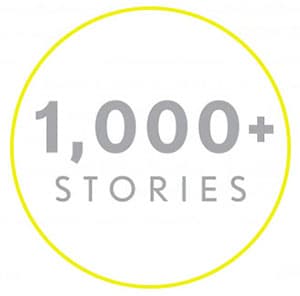This story is part of our 1,000+ Stories campaign. What’s your story?
Name: Maggie Georgopoulos
Business: MAGS Inspires
Location: Glasgow, United Kingdom
Industry: Professional Services
Reason for starting? MAGS Inspires started with my drive for more and, in the initial years, was in place to allow me to travel and undertake volunteer work in countries like Tanzania and South Korea, whilst being able to dip back in and take up a contract in HR, training or engineering to cover it. In the last 18 months, it has become a full business, which is about fulfilling my need to fill the gap around women in leadership — I am appalled that so little has changed since I left corporate — and mental health in the workplace. This is why my business is under 2 years old to me.
It is about getting the message out there, using the voice I have to help others to achieve their version of success, get more women into leadership roles where they can really thrive, and also de-stigmatize mental health. The mental health connected to leadership is really a strong passion, as people don’t seem to understand that you can be a highly successful and strong leader and still have a mental health condition!
Related: Read about another female entrepreneur here.
How do you define success? Success is being abundant enough support my current causes with more than my time. At present, I support the Unleashed Women’s Leadership Fund and a local charity started by a 14-year-old boy that supports children who have disabilities. Success to me, above this, is defined by the impact I have on the lives of others, the more women I help climb to the top of their ladders. With stereotypes still matching many of those that the Suffragettes fought against, we still have a long way to go. As an ex-executive chairman of the board, I am driven!
It also means making workplaces mental health friendly. Helping to de-stigmatize mental health is a passion which is equal to the one around empowering women. Success will happen here when more workplaces are open to the fact that a mental health disorder doesn’t mean lack of performance or leadership.
Biggest success: Sometimes it depends on how you define success. I have been featured in many different media formats from television to radio, podcasts, magazines and blogs, including Entrepreneur and Forbes magazines. I have won awards along the way, including a scholarship to the Australian Institute of Company Directors when I was in my early 30s. My role as executive chairman of the board of a large agricultural company is a success, as is sitting on government boards and working in industries such as oil & gas, manufacturing and automotive. Writing my book is as well.
Yet to me right now, my biggest success to date was standing up in front of 80 men and women from high level corporate and business life in the U.K. and sharing my vulnerability around the fact that I am bipolar — and have been since I was first diagnosed at 17 — and not only achieved all of this, but no one knew! This is a success because it was the start of my journey of speaking about it all around the world in order to help others.
Related: Meet the Men Who Invest in Female Entrepreneurs
What is your top challenge and how you have addressed it? There are many challenges in the career journey and the corporate journey, and yet, when I look back at it, it seems to get people to understand just how hurtful and offensive it can be being told that women aren’t good at certain things. As a mechanical engineer who is comfortable with maths and physics (those so called non-female subjects), I have always had to deal with the prejudices that come with stereotypes around what women are capable of in these industries. It always amused me that I would be told I was one of the boys — an interesting way to rationalize why I don’t fit the stereotype of what women want to do or are good at. I like this about as much as being told I shouldn’t be good at what I do. I overcame it by staying true to me. There were times when this was a struggle, but I kept going. There were times when it was lonely, but I looked for and found support. I am all woman, successful in a male-dominated field and wear a skirt! Pure, unadulterated, 100% me!
Who is your most important role model? I talk about this a lot. I grew up in a time when there were not a lot of female role models for me to look up at. Margaret Thatcher is the one I talk about the most. Here in the U.K., that gets some not-so-positive responses mainly because of her politics. It doesn’t take away from the fact that, as a 7-year-old, her achievement in being Prime Minister of the United Kingdom (and a woman) told me I could become PM one day if I wanted to as well (of Australia of course!). She showed me that anything was possible in a way that men couldn’t because she was someone I could relate to as another woman. There are women and men alike I admire, but she was definitely my most important role model. Although she was closely followed by my parents. They instilled in me a solid belief that I could be anything I wanted to be if I was willing to put in the work to achieve it. That is why I have never seen the stereotypes as a barrier to getting to where I want to go or my success in it.
[box_light]Website www.magsinspires.com
Twitter @magsinspires
Facebook www.
Instagram @
LinkedI www.linkedin.com/in/magsinspires[/box_light]
Tell us your story!
Read about another entrepreneur here.
Edited by The Story Exchange


